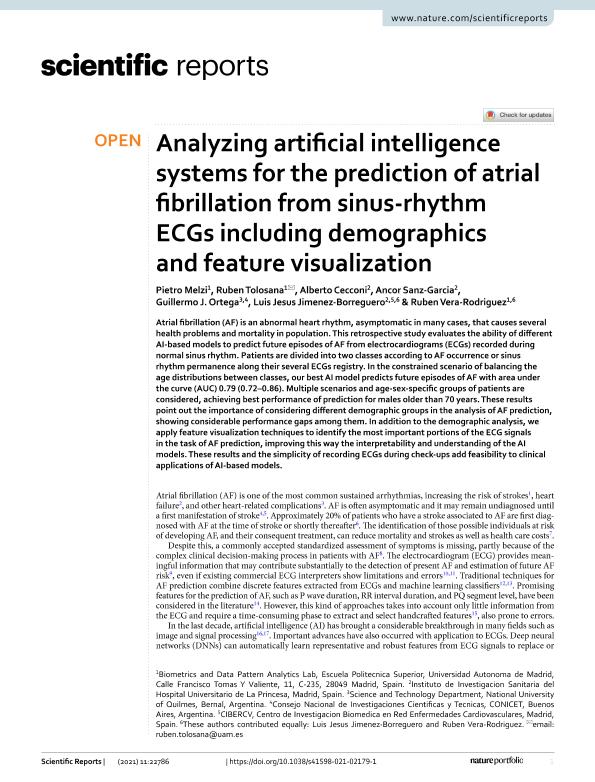Artículo
Analyzing artificial intelligence systems for the prediction of atrial fibrillation from sinus-rhythm ECGs including demographics and feature visualization
Melzi, Pietro; Tolosana, Ruben; Cecconi, Alberto; Sanz Garcia, Ancor; Ortega, Guillermo José ; Jimenez Borreguero, Luis Jesus; Vera Rodriguez, Ruben
; Jimenez Borreguero, Luis Jesus; Vera Rodriguez, Ruben
 ; Jimenez Borreguero, Luis Jesus; Vera Rodriguez, Ruben
; Jimenez Borreguero, Luis Jesus; Vera Rodriguez, Ruben
Fecha de publicación:
23/11/2021
Editorial:
Nature Publishing Group
Revista:
Scientific Reports
ISSN:
2045-2322
e-ISSN:
2045-2322
Idioma:
Inglés
Tipo de recurso:
Artículo publicado
Clasificación temática:
Resumen
Atrial fibrillation (AF) is an abnormal heart rhythm, asymptomatic in many cases, that causes several health problems and mortality in population. This retrospective study evaluates the ability of different AI-based models to predict future episodes of AF from electrocardiograms (ECGs) recorded during normal sinus rhythm. Patients are divided into two classes according to AF occurrence or sinus rhythm permanence along their several ECGs registry. In the constrained scenario of balancing the age distributions between classes, our best AI model predicts future episodes of AF with area under the curve (AUC) 0.79 (0.72–0.86). Multiple scenarios and age-sex-specific groups of patients are considered, achieving best performance of prediction for males older than 70 years. These results point out the importance of considering different demographic groups in the analysis of AF prediction, showing considerable performance gaps among them. In addition to the demographic analysis, we apply feature visualization techniques to identify the most important portions of the ECG signals in the task of AF prediction, improving this way the interpretability and understanding of the AI models. These results and the simplicity of recording ECGs during check-ups add feasibility to clinical applications of AI-based models.
Palabras clave:
deep learning
,
ecg
Archivos asociados
Licencia
Identificadores
Colecciones
Articulos(SEDE CENTRAL)
Articulos de SEDE CENTRAL
Articulos de SEDE CENTRAL
Citación
Melzi, Pietro; Tolosana, Ruben; Cecconi, Alberto; Sanz Garcia, Ancor; Ortega, Guillermo José; et al.; Analyzing artificial intelligence systems for the prediction of atrial fibrillation from sinus-rhythm ECGs including demographics and feature visualization; Nature Publishing Group; Scientific Reports; 11; 1; 23-11-2021; 1-10
Compartir
Altmétricas



